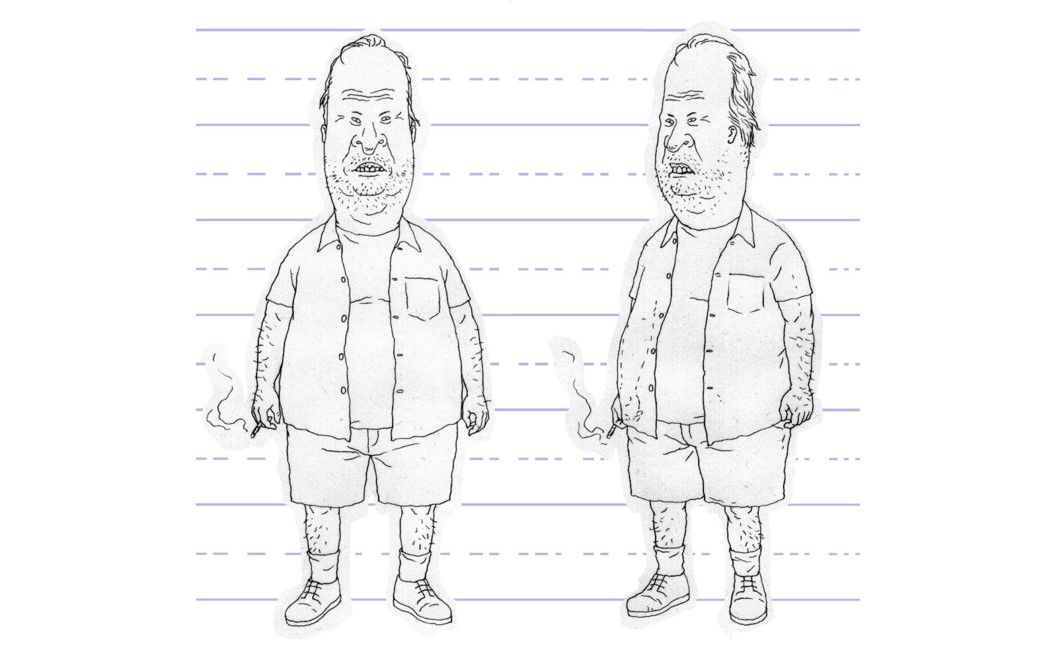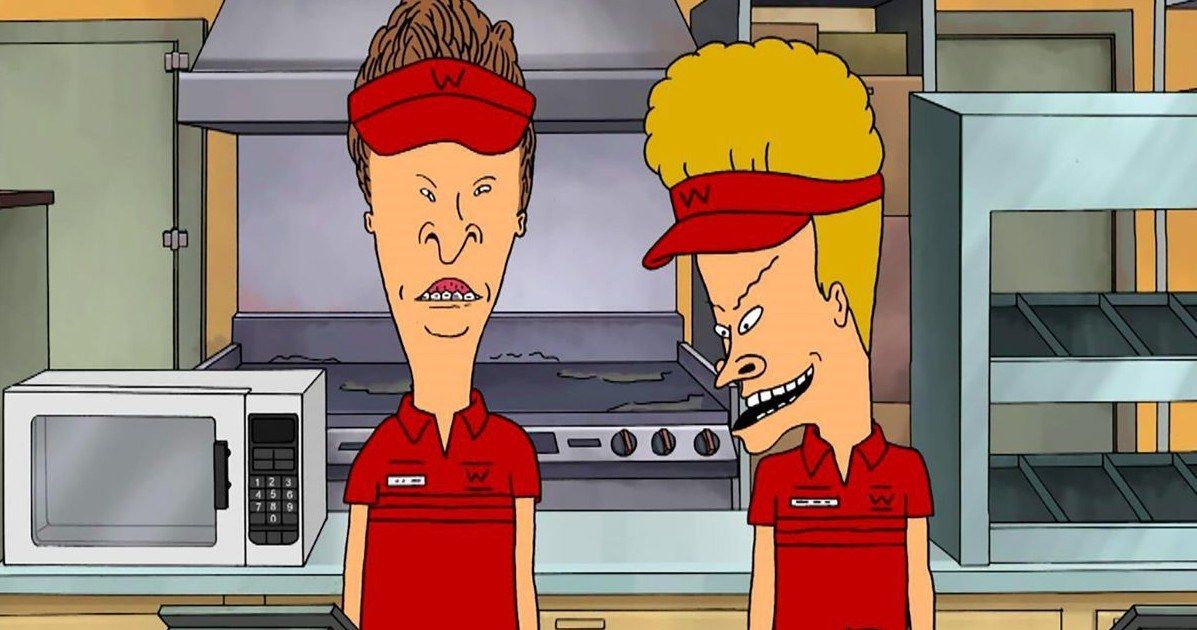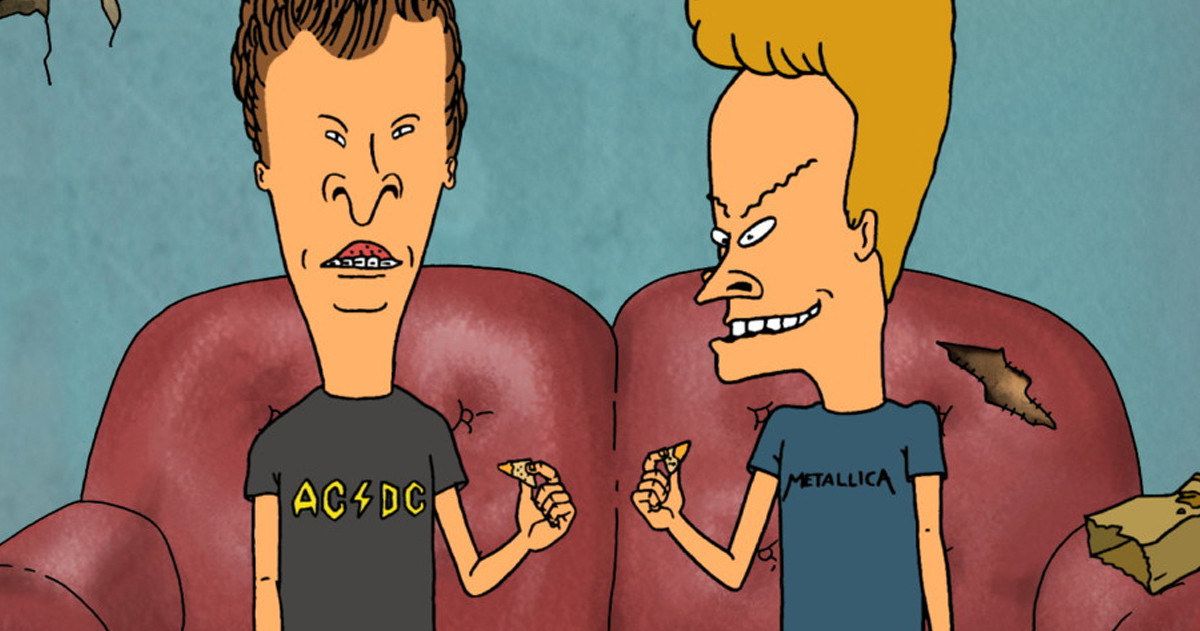One of the funniest and rudest shows representing '90s America, Beavis and Butt-Head, remain not only among two of the ugliest faces gracing TV but also the most loved, laughed at ones spanning decades. So, amidst growing interest in '90s nostalgia and aesthetic, reminiscing with the upcoming King of the Hill revival, the recent Friends reunion, and seemingly countless Disney live-action remakes, it might not come as such a surprise to hear that Beavis and Butt-Head is forecasted to receive the same treatment. But, with rumours of the famously adolescent main characters returning middle-aged, should fans prepare to be disappointed?
Picture it: the opening theme rings, fans are reminded of childhood, teenage years, adulthood greeted by the familiar, gritty voices as a blizzard of bright colours greets them into the snarky, not-too-quick-witted world of the two friends. But what is different? Is it the modern animation, the smoother lines, the sounds and voices which, coming through a laptop rather than an old JVC TV set, sound suspiciously less grainy? These changes are not uncommon for long-running TV shows, especially as animated series are run-of-the-mill of advancing technology. The Simpsons might be one of the clearest and mourned examples of this, with evolving character design, voice actors, and even noticeable changes in its writing.
What About the Characters Themselves?
As Comedy Central recently announced Beavis and Butt-Head's upcoming revival, there have also been hints that its world will be "reimagined" for the new generation of watchers, with Mike Judge himself suggesting that there will be a middle-aged Beavis and Butt-Head. There are concerns that the studio may be setting itself up for failure with this move. The reason for this mainly surrounds one question: will we find that, despite the inevitable changes in animation, writing, and then perhaps even further, a noticeable difference in the age of the protagonists themselves, we still feel that we are watching the same show? In other words, can Beavis and Butt-Head still work? When we sit down to our beloved '90s series and find our world following its opening theme, the issues and challenges we face are illustrated in a relatable mosaic of rude jokes, underlined by gargled chortling.
In an interview with VICE in 2013, Judge described how the show was already making noticeably outdated references when it was in production in 1992, with MTV suggesting a shift from the protagonists' focus on Metallica and AC/DC to more relatable bands like Pearl Jam and Nirvana. In this case, Judge concluded that "It's more of a state of mind than a cultural reference," and this seems to be a point that is soon to be disregarded in the upcoming revival.
With the uncertainty and stress of the ongoing pandemic, it almost makes sense that we would be comforted by the things we grew up with, looking to nostalgia to place us in a time when today's issues would barely have been imaginable. Despite what appears to be an effort to rekindle our love for the show by imbuing it with relatable scenarios and environment, do we want to see ourselves superimposed against the show we associate with the '90s, loved for its handling of American culture during that time? Similarly, its teenage protagonists provide a good gateway for any form of societal criticism, providing reasonable vessels for snarky jokes conveying satirical remarks through absurd logic. Teenagers can laugh at the morally void, ridiculous caricature of themselves, and adults can generally find joy in it, too, especially as they navigate relatable issues. The same humour might not apply in the same way coming from an adult Beavis, spoken by a Butt-Head who no longer struggles against his patronising high-school teacher but rather against the process of paying taxes.
King of the Hill Revival in the Works as Creators Launch New Animation Company
So, What Do We Want Out of the Revival?
This is not the first time Beavis and Butt-Head has struggled to connect with its target market, as a revival season released with MTV in 2011 was met with sinking views, a problem which, in an interview with Howard Stern, Judge later attributed to MTV's young-female demographic at this time, describing how "MTV's audience is like, eight to thirteen-year-old girls, and[…] they would get this different audience that they then couldn't cross-promote." Today, Judge seems to have ascended from his problems selling a show to teen girls, moving on to face the perhaps marginally more critical demographic of the world in 2022.
Arguably, all remakes and revivals face some form of criticism for their route of adaptation - what is removed and inserted from the original to impress us after the appeal of being reunited with our childhood favourite wears off. Inevitably, finding the balance between copying something and making it new, even when done to some degree of success, will not please all the original fans. For instance, the reboot of the Mad Max franchise in 2015 with Mad Max: Fury Road received a great reception, not only at the Oscars, but from many viewers, fans of the originals, and new watchers alike. The film largely held close to the setting, the atmosphere, and the character of the '80s originals, while also focussing on entirely new characters. Of course, not all fans were pleased - Fury Road was not and never would be the same show from the '80s, but that's not to say that those elements of the original, which were preservable, couldn't be appreciated and continued.
The argument remains to be settled on whether we as an audience are looking for more of the same when we are invited to watch a remake, and if so, how we can ever really achieve that in the case that our technology, actors, and culture itself have all changed since the original.
Mike Judge himself only made one remark in response to Comedy Central's press release on the show's revival, saying that "it seemed like the time was right to get stupid again." His comment perhaps suggests that the show intends to retain its asinine humour with an almost South Park-esque focus on the 2020s, where the '90s had previously been the victim. Those old issues which we saw Judge address -- hippies, the emotionally-stunted post-war generation of adults, and the dissolving nuclear family -- were depicted not only in Beavis and Butt-Head but also in King of the Hill. And what are our options? Do we want another joke about the broken pride of the 'Nam-Veteran? To find Judge's satire focused on levelling the playing field between Clinton's left and Bush's right? Do we want to immerse ourselves in a show which addresses issues gone by? Or are we ready to accept that, just as those issues are capable of aging, so too are Judge's characters.



